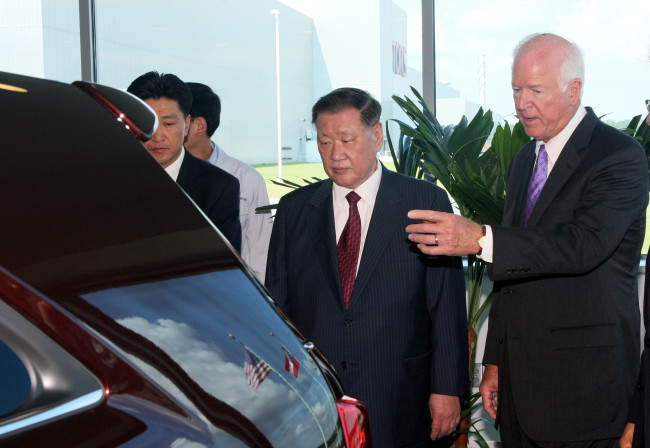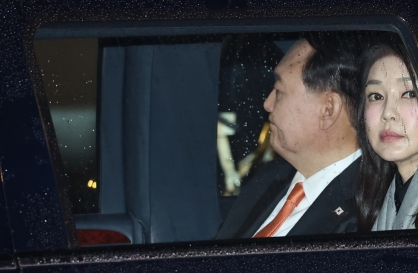Hyundai Motor Group chairman Chung Mong-koo stressed a prompt response to the recent sales recovery of Japanese rivals in his visit to the Korean auto behemoth’s U.S. operations on Wednesday.
Chung urged, among other things, to secure product quality as Hyundai has already increased production capacity by recently switching from a two-shift to a three-shift system, where three sets of workers change turns each day, in U.S. factories.
“The smooth operation of U.S. plants is essential in order to relieve short supply following a recent surge in the U.S. car demands,” the Hyundai Motor chief said while looking around the Georgia plant of Kia Motors.
“In order to continue to receive ‘reasonable car prices’ in the U.S. market, product quality should be guaranteed,” he said, referring to Hyundai’s lowered incentives for customers based on strong sales there.
Chung urged, among other things, to secure product quality as Hyundai has already increased production capacity by recently switching from a two-shift to a three-shift system, where three sets of workers change turns each day, in U.S. factories.
“The smooth operation of U.S. plants is essential in order to relieve short supply following a recent surge in the U.S. car demands,” the Hyundai Motor chief said while looking around the Georgia plant of Kia Motors.
“In order to continue to receive ‘reasonable car prices’ in the U.S. market, product quality should be guaranteed,” he said, referring to Hyundai’s lowered incentives for customers based on strong sales there.

The Georgia plant, which started production in 2009, has driven up Kia’s sales growth in the U.S., with its production surging from 167,000 units in 2010 to 272,000 units in 2011.
Since adopting the three-shift system in June last year, its production capacity further expanded to 360,000 vehicles. In the first seven months this year, the plant produced 201,000 vehicles, up 33.7 percent from the same period last year.
As part of his Georgia visit, Chung met Georgia Governor Nathan Deal and Senator Saxby Chambliss from the state to discuss future business partnerships.
On Thursday, the Hyundai Motor chief is scheduled to visit the carmaker’s factory in Alabama and meet Governor Robert Bentley. The Alabama plant is also expected to transfer to three-time shift next month.
The Korean auto giant, which owns Hyundai Motor and Kia Motors, elevated its market share in the U.S. from 2.6 percent in 2002 to 8.9 percent last year.
Despite an ever-growing demand for Hyundai cars there, the group is recently struggling to continue the sales momentum due to short supply.
Even though the carmaker has expanded U.S. production, the prolonged strike in Korea is putting pressure in meeting the growing overseas demands.
In July, Hyundai exported 94,576 vehicles to overseas markets, a 23.5 percent decrease compared to 126,541 units in June. In terms of exports to the U.S., both Hyundai and Kia saw their deliveries decline 25.2 percent and 12.7 percent, respectively, from the previous month.
In the meantime, Japanese rivals Toyota and Honda, which had suffered an unprecedented global sales drop in the wake of a massive recall incident and natural disasters, are upping offensive in the U.S. market.
In July, Toyota sold 139,759 vehicles, a 23.9 percent increase from June, while Honda recorded a 46.4 percent sales growth with 104,119 vehicles.
During the same period, Hyundai’s sales growth remained at 4.1 percent.
By Lee Ji-yoon (jylee@heraldcorp.com)
-
Articles by Korea Herald



![[AtoZ Korean Mind] Does your job define who you are? Should it?](http://res.heraldm.com/phpwas/restmb_idxmake.php?idx=644&simg=/content/image/2024/05/06/20240506050099_0.jpg&u=)















![[K-pop's dilemma] Is Hybe-Ador conflict a case of growing pains?](http://res.heraldm.com/phpwas/restmb_idxmake.php?idx=642&simg=/content/image/2024/05/07/20240507050746_0.jpg&u=)